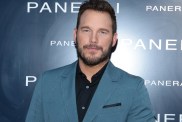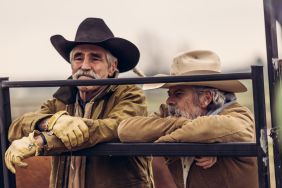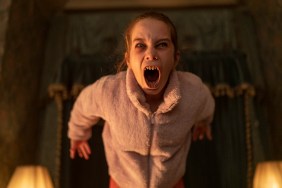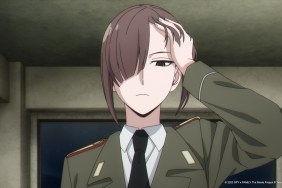
4 out of 10
Cast:
Britt Robertson as Sophia Danko
Scott Eastwood as Luke Collins
Alan Alda as Ira
Jack Huston as Young Ira
Oona Chaplin as Ruth
Melissa Benoist as Marcia
Lolita Davidovich as Linda Collins
Gloria Reuben as Adrienne Francis
Brett Edwards as Jared Midelton
Hunter Burke as David Stein
Alina Lia as Brooke
Review:
There’s an old story about bull riding that the flank strap is tied around the bull’s genitals to encourage it to buck harder, forcing it to contort its body to the point of breaking its own back in a futile effort to escape the pain. I have no idea if that’s true or not, but it’s as good a metaphor as any for describing what sitting through “The Longest Ride” is like.
The latest adaptation of a Nicholas Sparks novel focuses on a pair of attracted opposites – a shy art student from New Jersey and a downhome bull rider from North Carolina – who realize that their differences are likely too much to overcome, so they decide to have a brief fling with no fear of anything more developing … until it does. It is not just trite and clichéd but blatantly recalls past successes in such a calculating way — right down to the contrasting romances of yesterday and today — as to rob it of all life and in such an inept way as to rob it of all interest.
Whether you liked other Sparks-based works or not (and it is impossible to separate the film adaptation from the source material from which it derives most of its problems), it is impossible to ignore the lazy conflict and rabid emotional manipulation standing in for a plot, or the cardboard characters trying and failing to make it work. “Ride” exists in the type of world where, when a man sees the woman of his dreams on a date with someone else, the rain comes pouring down on him on cue while the single rose he holds literally wilts in his fist.
Lack of subtlety isn’t damning in and of itself, unless it comes tied to lack of charm, which unfortunately this does particularly in the modern day as Sophia slowly gives into the notion that the gulf between Luke and herself may be too large to be bridge. Robertson and Eastwood, cursed with the films worst dialogue, wallow between meet-cute scenes lacking cuteness – students at the uber-cosmopolitan Wake Forest University gawk at the first cowboy they’ve ever seen – and faux arguments which only show up when an act break nears, not as the result of any rising tension.
Sophia’s legitimate fears about the physical dangers of Luke’s career are generally left the background, to be dealt with instead by Luke and his mother (Davidovich). Like so many other Sparks novels, “Ride” has an unhealthy obsession with the past which quickly overrides the present and which turns out to be one of the films few saving graces as it introduces us to Chaplain’s Ruth who oozes mirth and sympathy as one of the interesting and believable characters in the film even when she’s falling prey to the worst of romance cliché.
She doesn’t have much choice as her 1940s paramour is a functional mute, either because Huston’s performance was so bad director George Tillman, Jr. (“Soul Food”) cut every utterance except the bare minimum needed, or if he is simply the most passive person on Earth. Based on future Ira (Alda), a septuagenarian art collector and Ruth’s widower rescued by Luke and Sophia from a car crash during their first date, I’m going with the latter.
And yet in him they get the world’s least likely conduit of life lessons about what it takes to make a relationship work wrapped up inside Sparks’ conceit of delivering said messages as on the nose as possible through letters or journal entries from the past. It’s a conceit even less believable here than when it’s been trotted out in the past as all of Ira’s letters are to Ruth during the time she was alive and with him and about events they witnessed together. It is hopelessly artificial.
Instead of retreading old narrative devices, Sparks or screenwriter Craig Bolotin (Desperately Seeking Susan) might have noticed the options for deepening their characters connections, such as the comparison of Sophia and Ruth’s different yet similar immigrant experience in America tied into the past/present dichotomy to show that the more things change the more they really do stay the same. But insight is not what “Ride” is about.
[If it were, someone might have noticed the inherent irony in Ira, a man who was basically led through ever part of his relationship by his wife, schooling anyone on the need for communication].
Tillman, who is no stranger to relationship-driven drama, does the best he can but considering what he has to work with his efforts amount to little more than slow-motion shots of bull snot flying through the air like silver spider webs or the subjects of one of Ruth’s paintings. Granted, romance stories aren’t about the real difficulties of actual romance – terrifying things like talking with another person – they’re about fantasy and fair enough. The problem with not embracing the difficulties is you can’t fully replicate the joys, either. And without them you have nothing but a dry, empty husk.
The Longest Ride
-
The Longest Ride

-
The Longest Ride

-
The Longest Ride

-
The Longest Ride

-
The Longest Ride

-
The Longest Ride

-
The Longest Ride

-
The Longest Ride

-
The Longest Ride

-
The Longest Ride

-
The Longest Ride

-
The Longest Ride

-
The Longest Ride

-
The Longest Ride

-
The Longest Ride










